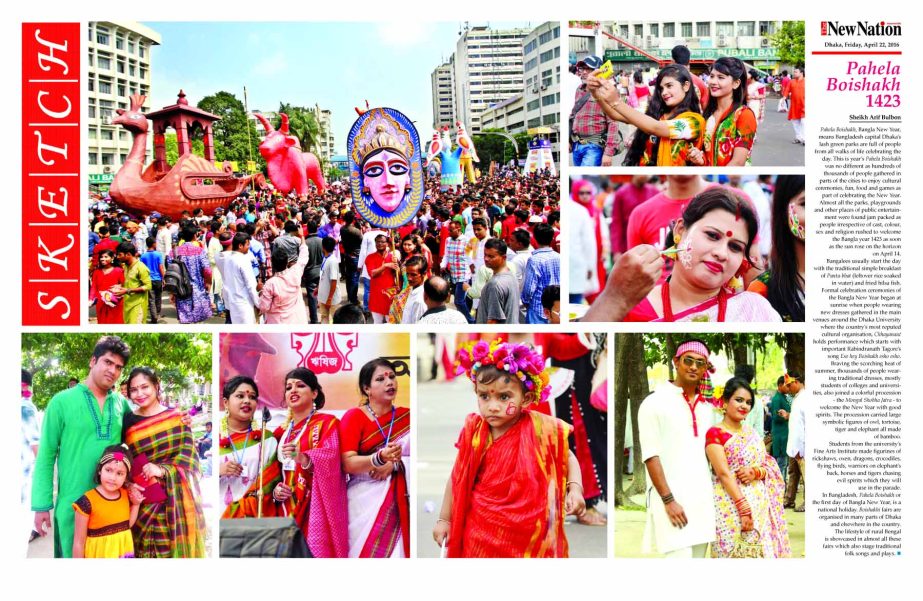
Sheikh Arif Bulbon :
Pahela Boishakh, Bangla New Year, means Bangladesh capital Dhaka’s lash green parks are full of people from all walks of life celebrating the day. This is year’s Pahela Boishakh was no different as hundreds of thousands of people gathered in parts of the cities to enjoy cultural ceremonies, fun, food and games as part of celebrating the New Year.
Almost all the parks, playgrounds and other places of public entertainment were found jam packed as
people irrespective of cast, colour, sex and religion rushed to welcome the Bangla year 1423 as soon
as the sun rose on the horizon
on April 14.
Bangalees usually start the day with the traditional simple breakfast of Panta-bhat (leftover rice soaked
in water) and fried hilsa fish.
Formal celebration ceremonies of the Bangla New Year began at
sunrise when people wearing new dresses gathered in the main venues around the Dhaka University where the country’s most reputed cultural organisation, Chhayanaut holds performance which starts with important Rabindranath Tagore’s song Eso hey Boishakh esho esho.
Braving the scorching heat of summer, thousands of people wearing traditional dresses, mostly
students of colleges and universities, also joined a colorful procession – the Mongal Shobha Jatra – to
welcome the New Year with good spirits. The procession carried large symbolic figures of owl, tortoise, tiger and elephant all made
of bamboo.
Students from the university’s Fine Arts Institute made figurines of rickshaws, oxen, dragons, crocodiles, flying birds, warriors on elephant’s back, horses and tigers chasing
evil spirits which they will
use in the parade.
In Bangladesh, Pahela Boishakh or the first day of Bangla New Year, is a national holiday. Boishakhi fairs are organised in many parts of Dhaka and elsewhere in the country.
The lifestyle of rural Bengal
is showcased in almost all these fairs which also stage traditional
folk songs and plays. n
Pahela Boishakh, Bangla New Year, means Bangladesh capital Dhaka’s lash green parks are full of people from all walks of life celebrating the day. This is year’s Pahela Boishakh was no different as hundreds of thousands of people gathered in parts of the cities to enjoy cultural ceremonies, fun, food and games as part of celebrating the New Year.
Almost all the parks, playgrounds and other places of public entertainment were found jam packed as
people irrespective of cast, colour, sex and religion rushed to welcome the Bangla year 1423 as soon
as the sun rose on the horizon
on April 14.
Bangalees usually start the day with the traditional simple breakfast of Panta-bhat (leftover rice soaked
in water) and fried hilsa fish.
Formal celebration ceremonies of the Bangla New Year began at
sunrise when people wearing new dresses gathered in the main venues around the Dhaka University where the country’s most reputed cultural organisation, Chhayanaut holds performance which starts with important Rabindranath Tagore’s song Eso hey Boishakh esho esho.
Braving the scorching heat of summer, thousands of people wearing traditional dresses, mostly
students of colleges and universities, also joined a colorful procession – the Mongal Shobha Jatra – to
welcome the New Year with good spirits. The procession carried large symbolic figures of owl, tortoise, tiger and elephant all made
of bamboo.
Students from the university’s Fine Arts Institute made figurines of rickshaws, oxen, dragons, crocodiles, flying birds, warriors on elephant’s back, horses and tigers chasing
evil spirits which they will
use in the parade.
In Bangladesh, Pahela Boishakh or the first day of Bangla New Year, is a national holiday. Boishakhi fairs are organised in many parts of Dhaka and elsewhere in the country.
The lifestyle of rural Bengal
is showcased in almost all these fairs which also stage traditional
folk songs and plays. n

